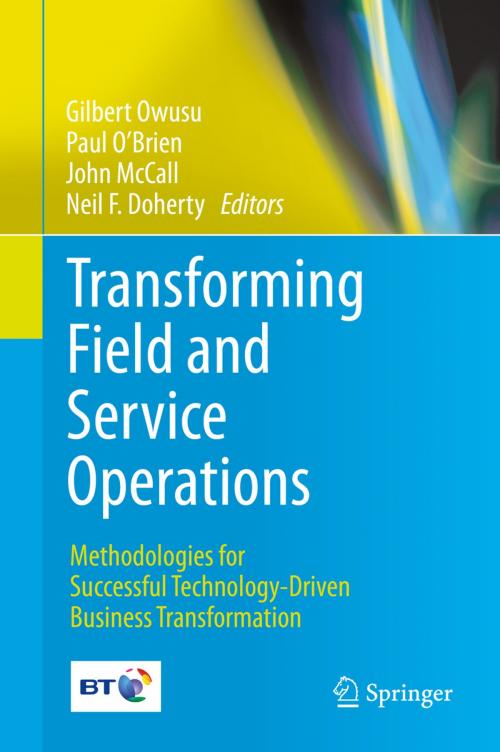Transforming Field and Service Operations
Methodologies for Successful Technology-Driven Business Transformation
Nonfiction, Computers, Database Management, Data Processing, Business & Finance, Industries & Professions, Information Management| Author: | ISBN: | 9783642449703 | |
| Publisher: | Springer Berlin Heidelberg | Publication: | January 21, 2014 |
| Imprint: | Springer | Language: | English |
| Author: | |
| ISBN: | 9783642449703 |
| Publisher: | Springer Berlin Heidelberg |
| Publication: | January 21, 2014 |
| Imprint: | Springer |
| Language: | English |
The drive to realise operational efficiencies, improve customer service, develop new markets and accelerate the introduction of new products has substantially increased the complexity of field service operations. To maximise the efficiency and effectiveness of these operations, organisations have embarked on a wide range of transformation programmes that have sought to introduce automation through the use of workforce management technologies. Despite the potential business value that can be provided by such transformation programmes, too often, the automation technologies have not been fully utilised and their expected benefits have as such not been realised.
Scholars of organisation change argue that the success of any transformation programme is a function of how well the technical, political, structural and social aspects of a specific project have been managed. The objective of this edited book is to provide insights into how organisations might successfully transform their field service operations with the help of workforce management technologies. Accordingly, the book is organised into four sections: Section A “The Case for Transforming Service and Field Operations” explains the rationale as to why organisations should actively consider transforming their service and field operations, while Section B presents various “Methods, Models and Enabling Technologies for Transforming Service and Field Operations”. In Section C, a number of “Case Studies” illustrate how new technologies can be applied to field and service operations to deliver concrete business benefits. Lastly, Section D considers “Challenges, Outcomes and Future Directions”.
Overall, this book provides valuable insights into how to successfully transform field service operations with automated technologies. It draws on years of experience from different industries and from different perspectives on realising change. It is aimed at managers, technologists, change agents and scholars who are interested in field service operations in general and the use of advanced computing technologies in this area in particular.
The drive to realise operational efficiencies, improve customer service, develop new markets and accelerate the introduction of new products has substantially increased the complexity of field service operations. To maximise the efficiency and effectiveness of these operations, organisations have embarked on a wide range of transformation programmes that have sought to introduce automation through the use of workforce management technologies. Despite the potential business value that can be provided by such transformation programmes, too often, the automation technologies have not been fully utilised and their expected benefits have as such not been realised.
Scholars of organisation change argue that the success of any transformation programme is a function of how well the technical, political, structural and social aspects of a specific project have been managed. The objective of this edited book is to provide insights into how organisations might successfully transform their field service operations with the help of workforce management technologies. Accordingly, the book is organised into four sections: Section A “The Case for Transforming Service and Field Operations” explains the rationale as to why organisations should actively consider transforming their service and field operations, while Section B presents various “Methods, Models and Enabling Technologies for Transforming Service and Field Operations”. In Section C, a number of “Case Studies” illustrate how new technologies can be applied to field and service operations to deliver concrete business benefits. Lastly, Section D considers “Challenges, Outcomes and Future Directions”.
Overall, this book provides valuable insights into how to successfully transform field service operations with automated technologies. It draws on years of experience from different industries and from different perspectives on realising change. It is aimed at managers, technologists, change agents and scholars who are interested in field service operations in general and the use of advanced computing technologies in this area in particular.















